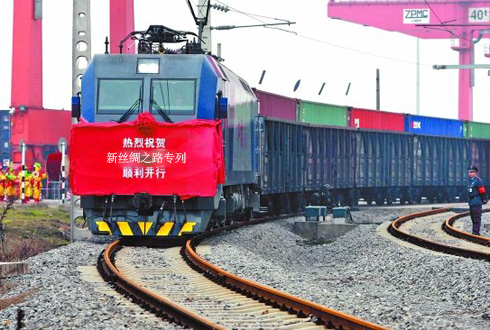The Silk Road and China's 21st century spirit
china.org.cn / chinagate.cn by Cheng Yongnian, June 26, 2014 Adjust font size:
|
A freight train route linking China's Hefei city to Central Asian countries starts operation. [news.wehefei.com] |
The rise of any nation will require what Georg Hegel calls 'a spirit of the age' (Zeitgeist), which a country will either unintentionally comply with or voluntarily create.
For the British Empire in the 18th-19th centuries, the spirit of the age was free trade; while for the United States from the late 19th century through the 20th century, it was liberty and democracy. So, what is China's spirit of the age in the 21st century?
Some people may say the spirit is the self-confidence and rejuvenation of the Chinese civilization. The Silk Road, part of the ancient Chinese civilization, will also help China restore its confidence in the international political arena.
In mentioning the old route, China does not seek to simply repeat its ancient civilization, let alone follow in the steps of the British Empire or the United States. Instead, China has to go beyond its own past and that of the imperial Western powers.
Free trade became the British Empire's spirit of the age because trade complied with the trend of worldwide economic development in that era. It helped the United Kingdom to build its global empire, backed up by guns and cannons in scenes where trading ships were trailed by warships.
With the fall of the British Empire, the rising United States took over to become a global power. But the United States was not a rival to Britain in terms of trade power. The United States pursued a reciprocal policy in which it only opened to countries with which a bilateral, reciprocal deal could be reached.
Instead of free trade, it was liberty and democracy that constituted the U.S. spirit of the age. Liberty and democracy once gave the United States unlimited appeal.
Despite having a different spirit of the age, the rise of the United States was also backed up by guns and violence. Sanctioning others, solving disputes by force, and even occupying another country have been part of the "liberty and democracy" preached by Washington.
A spirit of the time could foster a country's growth, but when such a spirit was improperly used, or even supported by force, it would no longer sustain growth.
Honoring peace
China needs to find a spirit from its long-running cultural deposits, and tailor it to current demands. At the same time, it should refrain from fueling a rise modeled on the British Empire and the United States, or Germany, Japan or the former Soviet Union.
China's past experience in terms of opening up could still benefit its current growth. The way in which ancient China has opened up to the world could be summarized as "a tributary system coexisting with the Silk Road."
The system, which has been demonized by both China and other countries, was regarded as an expression of what was known as the 'Chinese imperialism' or 'Chinese chauvinism.' This was not the historical view, but judging the past by current standards, or, judging Chinese culture from Western criteria.
The tributary system does embody unfair practices, including the "kowtow rituals," which may be difficult for the West to accept, because it represented hierarchy and inequality. However, the system is an "expression of reciprocity" as honored by China.
In essence, the tributary system was a trade system in which the kowtow ceremonies were formalities while trade was the purpose. Tributary states routinely paid homage to the Chinese dynasties, but through kowtowing, those states were normally bestowed with gifts far more valuable than their offerings, besides the right to trade with China.
This was a low-cost trade model. While the tributary countries managed to trade with China through bows and kowtows, the Western powers had to rely on guns and forces to open the door to China.
This is not to say that China still wants to continue this tradition today, but that the ritual was legitimate enough in that era, and was a practice accepted by both parties, otherwise it would be difficult to explain how the system managed to survive for thousands of years.
But when Western powers were at its gate, China still refused to move with the spirit of that age and clung to obsolete values, which brought about its own failure.
Compared with the tributary system, the Silk Road did not arouse any disputes. The Chinese government is now proposing a revival of both the Silk Road (on land) and the Maritime Silk Road, which in fact both existed.



